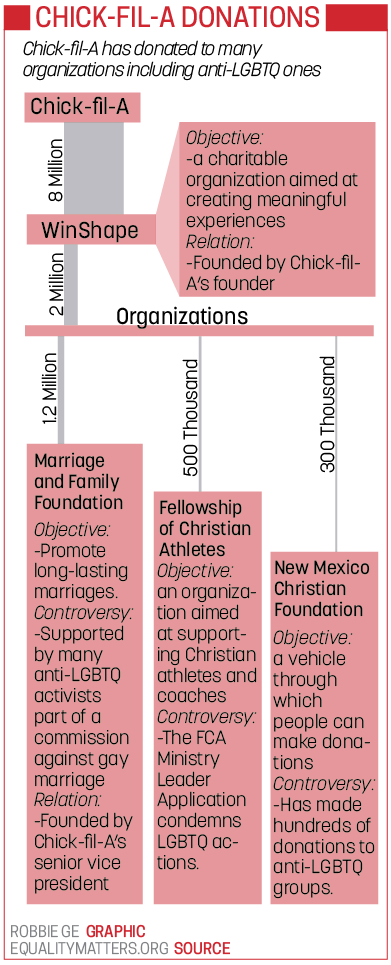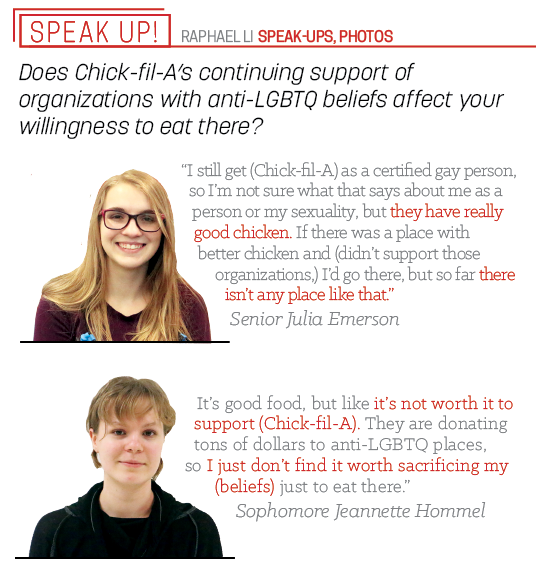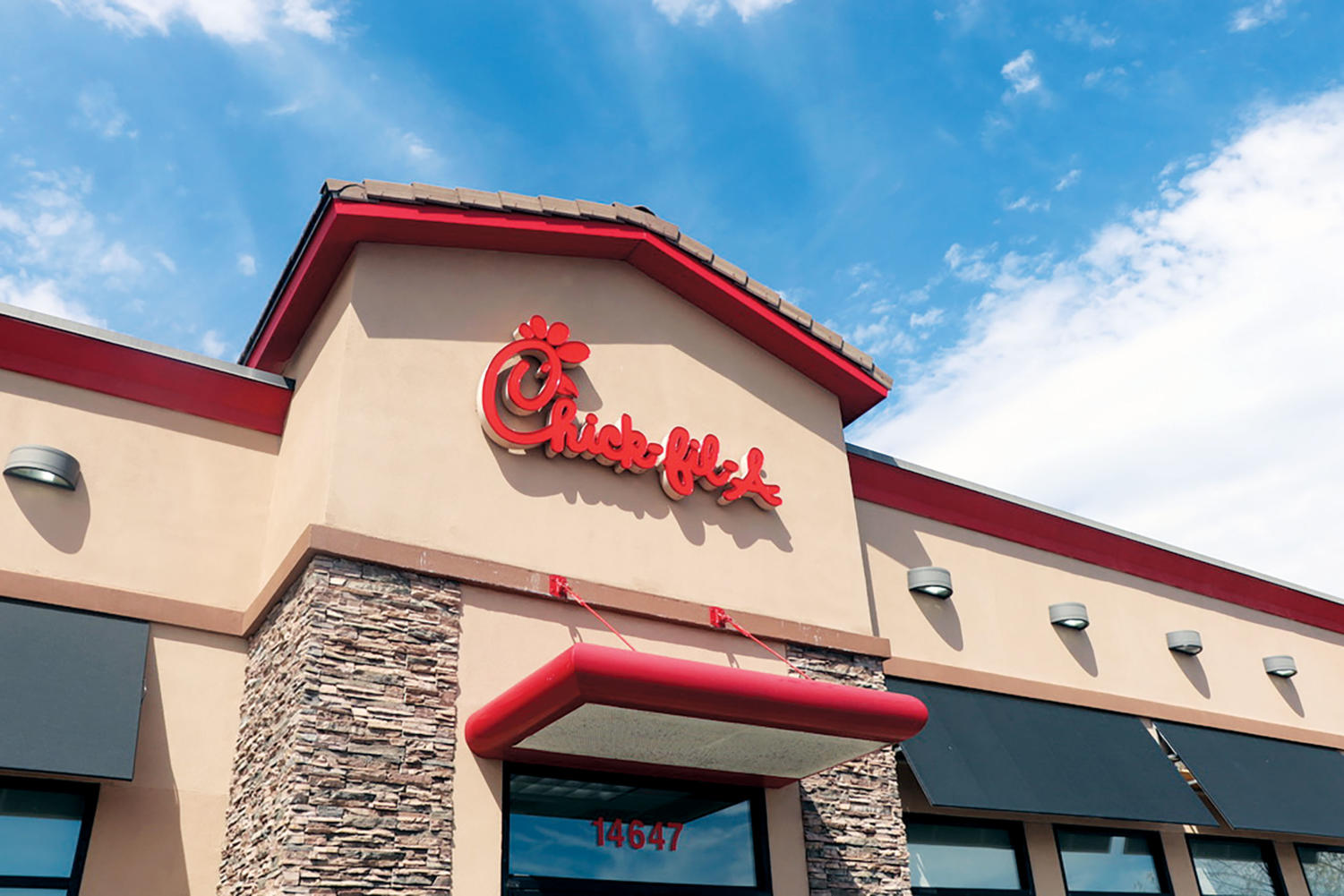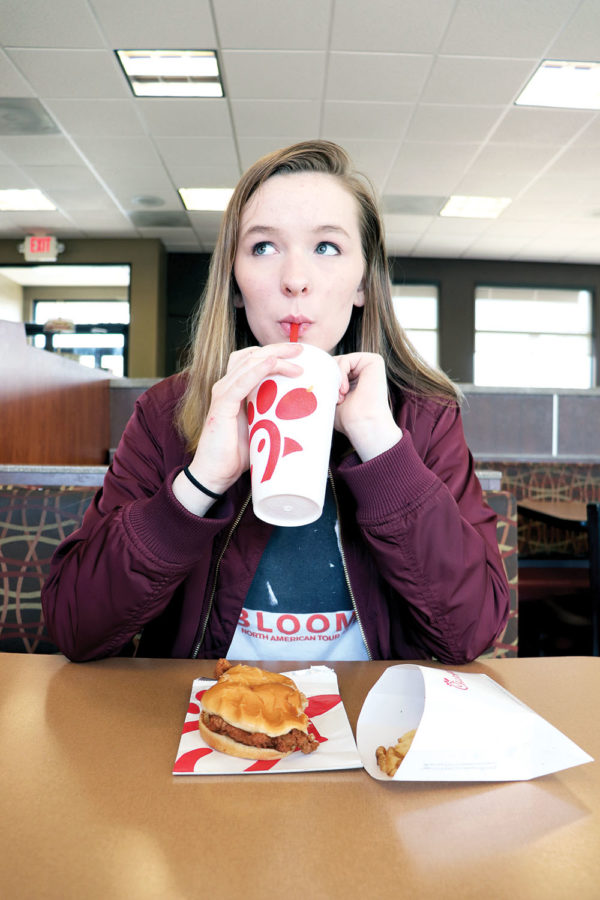A few months ago, freshman Daniel Tanner started to boycott Chick-fil-A.
“There had been a lot of news about how they treated their employees, little rumors and stuff, and then them being a big Christian company, obviously the connotation to some people of that is negative,” Tanner said. “Some people always think that a company like that is going to have some bad sides, but then lately, the news has really been pumping it out.”
In March, news site ThinkProgress released tax filings showing that in 2017, Chick-fil-A donated over $1.8 million to groups with a history of discriminating against the LGBTQ community. This gave rise to an outburst of news stories and protests, including the cancellation of plans to include the restaurant in New York’s Buffalo Niagara International Airport and Texas’s San Antonio International Airport.
 Tanner said it was this news that led him to boycott the restaurant, despite enjoying the food.
Tanner said it was this news that led him to boycott the restaurant, despite enjoying the food.
Tanner said, “A lot of people like (Chick-fil-A), and it’s a good brand, and they make good food, so it was unfortunate to see that they outwardly support (anti-LGBTQ organizations).”
However, Todd Haugh, assistant professor of business law and ethics at IU Kelley School of Business, said boycotts like Tanner’s are not effective as they tend to be isolated and short-run.
Sophomore Anna Thompson said she agreed with Haugh’s assessment—she said a boycott would be helpful if it were on a large scale, which is hard to organize.
A study conducted by Northwestern University professor Brayden King found that corporations tend to respond to boycotts if they struggle with their public image, while corporations with strong reputations are less likely to concede to public demands.
According to Tanner and Thompson, Chick-fil-A has a strong reputation, indicating that the company may be reluctant to change its policies.
“I think they’re a great company and they do a lot of good stuff for the community, too. This is just one bad thing that they do,” Thompson said.
For example, Chick-fil-A donated food to blood donors in Orlando after the shooting at Pulse, a popular gay nightclub, despite the company’s largely conservative values.
It is these values that Tanner said he wants the company to clarify.
“I would stop the boycott if they just came out and said, ‘Yes, we (donate to anti-LGBTQ organizations),’ just because they are trying to hide it at a lot of points,” he said. “They’ve been asked to make a statement, and they just don’t say anything.”
 In 2012, the fast-food chain sparked controversy after its president indicated that the company supported anti-LGBTQ marriage. In response to public outrage, the company released a statement saying that it is the “Chick-fil-A culture” to treat every person with “honor, dignity and respect,” according to fact-checking site Snopes. However, the news proved the company continued to donate to anti-LGBTQ organizations, which stirred additional debate.
In 2012, the fast-food chain sparked controversy after its president indicated that the company supported anti-LGBTQ marriage. In response to public outrage, the company released a statement saying that it is the “Chick-fil-A culture” to treat every person with “honor, dignity and respect,” according to fact-checking site Snopes. However, the news proved the company continued to donate to anti-LGBTQ organizations, which stirred additional debate.
Haugh said companies run into difficulties when they are not transparent about their values, especially with a new generation entering the market who places a larger emphasis on authenticity and transparency.
“Chick-fil-A is pretty out in the open,” Haugh said. “They’re actually in a lot of ways authentic with their values. It’s just, maybe values that a lot of younger people don’t necessarily identify or agree with.”
Thompson said the fast food chain’s practice of donating to anti-LGBTQ organizations has led her to lose respect for the company and its values.
“(Chick-fil-A) said that they would stop donating to anti-LGBTQ organizations, but they didn’t, so I was just kind of upset about that,” she said.
Overall, Thompson’s and Tanner’s views reflect a generational shift in thinking that will continue to affect the market and the businesses within, according to Haugh.
“Even these more traditional-type industries are starting to change how they view things and start to focus more on the values that are salient to (younger generations),” he said.
In the end, Thompson said customers play a role in a company’s behavior, but they can only do so much.
She said, “(Customers) have to show the company what they’re willing to support and what they’re not willing to support, but when you get down to it, it’s the company’s responsibility to make those changes and take the moral high ground and change the things that are corrupt about them.”

The Chick-fil-A off of North Meridian St. is one of the many situated in central Indiana. Chick-fil-A has been facing criticism for their political stances.



















![Joseph Broman, Mu Alpha Theta sponsor, grades tests for his honors precalculus/trigonometry class. Broman said, “I’m retiring from the Math Club next year and I’m just going to do Mu Alpha Theta so I can focus on that one and we can do more [speaker series] first semester.”](https://hilite.org/wp-content/uploads/2024/03/IMG_9502-1200x900.jpg)











![British royalty are American celebrities [opinion]](https://hilite.org/wp-content/uploads/2024/03/Screenshot-2024-03-24-1.44.57-PM.png)




















![Review: “The Iron Claw” cannot get enough praise [MUSE]](https://hilite.org/wp-content/uploads/2024/04/unnamed.png)
![Review: “The Bear” sets an unbelievably high bar for future comedy shows [MUSE]](https://hilite.org/wp-content/uploads/2024/03/unnamed.png)
![Review: “Mysterious Lotus Casebook” is an amazing historical Chinese drama [MUSE]](https://hilite.org/wp-content/uploads/2024/03/0.webp)
![Thea Bendaly on her Instagram-run crochet shop [Biz Buzz]](https://hilite.org/wp-content/uploads/2024/03/IMG_0165-1200x838.jpg)
![Review: Sally Rooney’s “Normal People,” is the best book to read when you are in a time of change [MUSE]](https://hilite.org/wp-content/uploads/2024/03/20047217-low_res-normal-people.webp)
![Review in Print: Maripaz Villar brings a delightfully unique style to the world of WEBTOON [MUSE]](https://hilite.org/wp-content/uploads/2023/12/maripazcover-1200x960.jpg)
![Review: “The Sword of Kaigen” is a masterpiece [MUSE]](https://hilite.org/wp-content/uploads/2023/11/Screenshot-2023-11-26-201051.png)
![Review: Gateron Oil Kings, great linear switches, okay price [MUSE]](https://hilite.org/wp-content/uploads/2023/11/Screenshot-2023-11-26-200553.png)
![Review: “A Haunting in Venice” is a significant improvement from other Agatha Christie adaptations [MUSE]](https://hilite.org/wp-content/uploads/2023/11/e7ee2938a6d422669771bce6d8088521.jpg)
![Review: A Thanksgiving story from elementary school, still just as interesting [MUSE]](https://hilite.org/wp-content/uploads/2023/11/Screenshot-2023-11-26-195514-987x1200.png)
![Review: When I Fly Towards You, cute, uplifting youth drama [MUSE]](https://hilite.org/wp-content/uploads/2023/09/When-I-Fly-Towards-You-Chinese-drama.png)
![Postcards from Muse: Hawaii Travel Diary [MUSE]](https://hilite.org/wp-content/uploads/2023/09/My-project-1-1200x1200.jpg)
![Review: Ladybug & Cat Noir: The Movie, departure from original show [MUSE]](https://hilite.org/wp-content/uploads/2023/09/Ladybug__Cat_Noir_-_The_Movie_poster.jpg)
![Review in Print: Hidden Love is the cute, uplifting drama everyone needs [MUSE]](https://hilite.org/wp-content/uploads/2023/09/hiddenlovecover-e1693597208225-1030x1200.png)
![Review in Print: Heartstopper is the heartwarming queer romance we all need [MUSE]](https://hilite.org/wp-content/uploads/2023/08/museheartstoppercover-1200x654.png)























![Review: Ladybug & Cat Noir: The Movie, departure from original show [MUSE]](https://hilite.org/wp-content/uploads/2023/09/Ladybug__Cat_Noir_-_The_Movie_poster-221x300.jpg)

![Review: Next in Fashion season two survives changes, becomes a valuable pop culture artifact [MUSE]](https://hilite.org/wp-content/uploads/2023/03/Screen-Shot-2023-03-09-at-11.05.05-AM-300x214.png)
![Review: Is The Stormlight Archive worth it? [MUSE]](https://hilite.org/wp-content/uploads/2023/10/unnamed-1-184x300.png)





